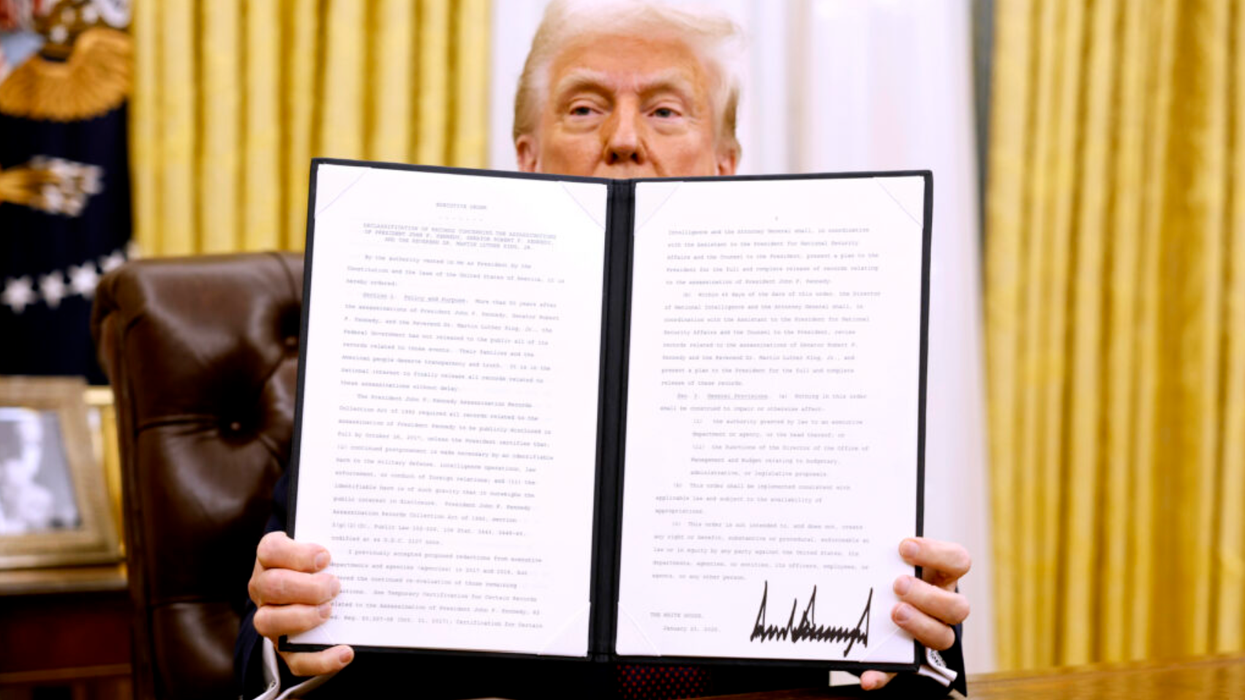Whether you’re feeling queasy or euphoric, or even a bit of both about the opening weeks of the second Trump presidency, my advice is to remember Stein’s Law. Richard Nixon’s former chief economic adviser, Herb Stein, declared: “If something cannot go on forever, it will stop.”
I’ve found this to be a valuable, if obvious, insight for the stock market, depressed teenagers and, of late, political junkies.
For those who follow such things closely, the sheer pace and audacity of Donald Trump’s opening gambits have breathed new life into cliches such as “drinking from a firehose.” The cadres of lawyers trying to impede both Elon Musk’s DOGE and OMB Director Russell Vought look like they are trying to change a tire on a moving car.
It’s especially difficult to make discerning judgments about the various efforts in a climate where Trump’s most ardent fans seem to support all of it and Trump’s foes oppose all of it. I have a variety of opinions on these zone-flooding efforts. One key distinction is between the policy and the process. I’d put some things in the bucket where I agree with both the policy and the process, including his executive order on trans athletes and school sports. Others, I may agree or disagree with the policy but the process looks illegal or unconstitutional. His executive order revoking birthright citizenship seems patently unconstitutional to me. Though I am decidedly ambivalent about the goal.
The Musk-led effort to dismantle government agencies from within contains all of these tensions, and the arguments over all of it will play out in the courts, and eventually, Congress.
And that’s the key word: eventually. Because the pace and process of the last three weeks is unsustainable. My American Enterprise Institute colleague Yuval Levin makes a valuable point: Every new administration — with the notable exception of the first Trump presidency when Trump was effectively the dog that caught the car — controls the political agenda at the outset. As Levin notes, “They’ve made plans. And you don’t know those plans, generally. They do, and they’re rolling them out at a certain pace and in a certain way. And it just feels like they are in command of the world.”
It’s not just that they have plans. New presidents command maximal loyalty and enthusiasm from their own party and voters. The opposition party is demoralized, licking its wounds and second-guessing its mission and message. Press coverage tends to be maximal because reporters are looking to cultivate sources in the new administration and that requires ample “ beat-sweetening ” coverage.
But eventually, whether you see this period as a glorious honeymoon or dismaying horror show, this chapter ends. Outside events will put the White House on defense. Indeed, Trump’s first attempt to impose tariffs caused the White House to beat a momentary retreat when the stock market tanked as a result. His new round of steel tariffs will have real world consequences, too. And whatever those are, they will have political consequences.
To be sure, the debut of Trump 2.0 is an exaggeratedly steroidal replay of this dynamic, but it’s a familiar dynamic all the same. Soon, Trump will have to get the narrowly GOP-controlled Congress to pass a budget, raise the debt ceiling and work on Trump’s legislative agenda. That will require Republicans to behave less like pundits and more like legislators. And the hostility he is earning from Democrats will make bipartisan legislation exceedingly difficult, if not impossible. This drama will also cause the political spotlight to move down Pennsylvania Avenue in ways that will take Trump out of his comfort zone.
Meanwhile, the courts are already demonstrating the limits of presidential power. The legal system moves slowly, but it also moves according to its own imperatives. Many worry that Trump will refuse to show appropriate deference to the courts when they inevitably deliver political setbacks. If or when he refuses to comply in whole or in part, or even merely launches rhetorical attacks on the judiciary, it will change the political dynamic. If he overplays his hand, members of his coalition might break with him, financial markets panic and some voters surely will blanch. It’s unlikely he’ll attract new supporters in the process.
Trump obviously sees the presidency as a quasi-monarchical, “ personalist ” institution with sweeping powers. He is committed to testing that theory. But he is also more interested in the appearance of such authority than the reality of it. That’s a check on his range of action as well. If overstepping makes him look weak, he might prefer to do less and continue to appear strong to his fans.
Regardless, the window of appearing unchecked and in command of the agenda will close sooner rather than later.
Jonah Goldberg: This cannot go on forever was originally published by the Tribune Content Agency and is shared with permission. Jonah Goldberg is editor-in-chief of The Dispatch and the host of The Remnant podcast. His Twitter handle is @JonahDispatch.




















Trump & Hegseth gave Mark Kelly a huge 2028 gift